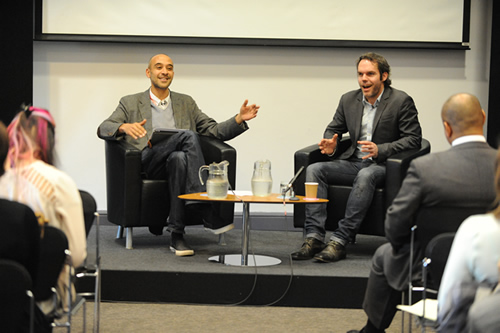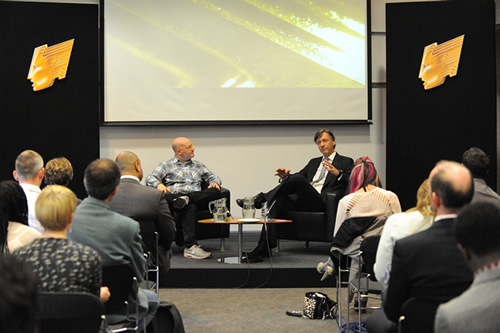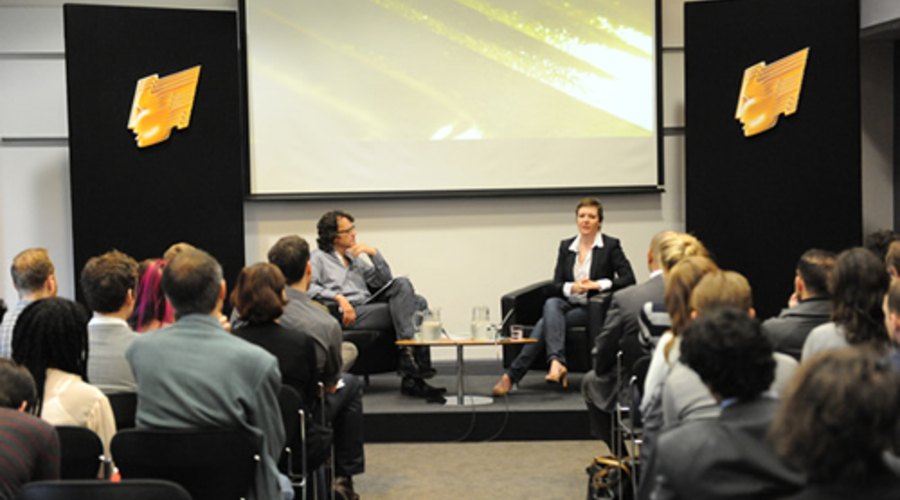Television practitioners from a range of programme backgrounds gave insights into their working lives at three packed RTS Student Masterclasses.
The sessions were held at the Barbican Centre in London on 17 May, to coincide with the annual RTS Student Television Awards.
Both Elaine Pyke, director of Sky Atlantic, and Colin Barr, a BBC specialist in drama documentary, told the audience of wannabes how their careers in TV had begun almost by accident
Pyke had worked as what she described as “a jobbing actress” after dropping out of university. Despite working for the RSC and getting parts in such high-profile TV shows as Peak Practice and The Bill by the time she’d reached 30 Pyke felt her career was going nowhere.
Thinking it would be relatively easy to land a job in TV she applied for 30 jobs at the BBC while at the same time working in the BBC post room. Pyke wasn’t offered a job at the corporation but eventually she secured a job as a script editor on the rebooted Crossroads.
After several months the soap was axed. Deciding to go for broke, the budding drama executive then left the UK and headed for Africa. Employed by the Nairobi-based production company, Mediae, she storylined and worked with the local team scripting the drama, Makutanu Junction. Seven seasons later the show is still on air.
On her return to the UK Pyke accepted a job as an executive producer on the Sky 1 football soap, Dream Team.
“Dream Team was much loved but it was not high quality,” recalled Pyke. “It was budgeted at £150,000 an hour… and this was at the time US drama was raising its game with shows such as Nip Tuck and ER.”
It was decided that if the satellite broadcaster’s original British drama was to make a big splash, more money would need to be spent on the shows.
Pyke’s first breakthrough came with an adaptation of Terry Pratchett’s Hogfather, which cost £6m and was shot in HD.
Her next project involved adapting Martina Cole’s crime novel, The Take.
“I am not a snob about pop culture…Some people might consider The Take downmarket literature but our adaptation was a great, upmarket production,” said Pyke.
With the BBC and ITV both backing a lot of high-quality drama, Sky decided their shows needed to be genuinely distinctive. “We had to have a point of difference,” she said. “Our drama is more male-skewed, of a certain scale, with very high production values and we tend to cast sexy actors.”
Strike Back, co-produced with HBO, and Mad Dogs, made by Left Bank, typified this approach.
She admitted that working with US executives could sometimes be difficult. “They don’t always appreciate our dry humour,” said Pyke.
She added: “Writers have the toughest job in the world. They have to listen to all these opinionated executives, like me.”
Documenting our times
Unusually, Colin Barr, executive producer of the acclaimed BBC Three programme, Our War, mixes drama and documentary to help illuminate the truth about our times.
His topics embrace the war in Afghanistan and a London gang war, the subject of My Murder.

Originally Barr had wanted to follow in his father’s footsteps and pursue a career as a print journalist. But the life of a newspaper reporter was not what he felt cut out for. “I was a really crap reporter,” he remembered. “I realised my talents were much more suited to being a producer-director.
Making short-turnaround current-affairs shows for BBC Scotland – 12 a year – was a wonderful apprenticeship, said Barr. “It was like living a life accelerated. I learnt how to tell stories.”
These techniques were honed further when he began producing the pioneering MacIntyre Undercover.
In the series, the eponymous Irish doorstepper, Donal MacIntyre, exposed a range of nefarious activities, including football hooliganism and the exploitation of fashion models.
Barr liked the way the show, despite being networked by the BBC, highlighted the human side of being an investigative reporter and that MacIntyre’s style was anything but patrician.
Moving beyond documentary into drama documentary, Barr’s subjects included two very troubled men - top barrister George Carman and media tycoon Robert Maxwell. David Suchet, rather incredibly, played both parts – in Get Carman and Maxwell.
“I can’t pretend that I am not interested in how big the audiences are for my shows,” admitted Barr. “One thing I like about doing drama documentaries is that more people will tune in than if you’re making an edition of Panorama or another current affairs series.”
“I work in the cracks between genres,” Barr pointed out. “And then try and synthesize the results… In Get Carman we used drama to tell the story of George Carman’s famous cases and documentary to tell the story of his private life.”
The production team interviewed all three of the late legal eagle’s three wives.
A legend in his own breakfast-time
Richard Madeley, who will forever be associated with ITV flagship show, This Morning, was the subject of the final Masterclass.
With his wife Judy Finnigan he has been a part of the TV fabric for more than three decades – memorable both for the ridiculous, (impersonating Ali G), and for a conversational style of interviewing that extracted answers from the likes of Bill Clinton that other, supposedly more skilled, practitioners couldn’t get.

Madeley began his TV career presenting reports for Yorkshire TV’s Calendar before moving to Granada and meeting Finnigan.
The couple were hired to present This Morning, believed to be the UK’s first daytime magazine show, in 1988.
“I think of myself as a reporter – that’s how I started in local newspapers,” he said.
Entertaining has always been a big part of Madeley’s schtick. “You can’t call impersonating Ali G journalism, can you?”
While presenting This Morning Madeley became renowned for the show’s risqué items such as the live trial of new wonder drug, Viagra. Three couples were brought on the show, given the pills and sent to a nearby hotel to test their effect.
“Judy and I were vehement that you could cover anything provided you got the tone right and watched your language. Obviously, if we’d shown a flaccid penis and [then] a great steaming erection we would have had problems.”
“Politics” led to a move to Channel 4 in 2001 for Richard & Judy, a one-hour, later afternoon show. “We cocked it up,” he recalled. But eventually they found their feet.
Madeley has left the five-day-a-week show behind and now appears hosting shows such as Have I Got News For You and one-off documentaries such as Madeley Meets the Squatters, which aired on ITV last December.
“I’m still dabbling in TV, but in a peripatetic way.”
Full reports of the Student Masterclasses will appear in the June edition of Television
Report by Steve Clarke and Matthew Bell

